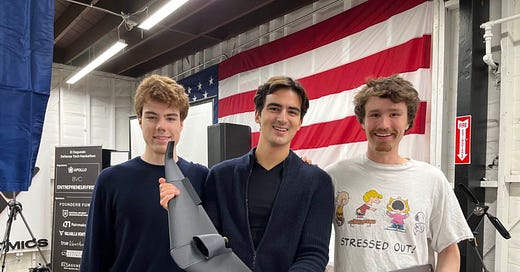Building upon the recent episode in which I talked to Matt Erickson about the “PayPal Mafia,” I started to follow some of them on Twitter. Something that I found of great interest was a “hackathon” that was done last weekend. These events bring together the leading minds in technology and defense to collaborate and create solutions to some of the most pressing challenges for the future of national defense.
The Defense Tech Hackathon in El Segundo (DTH) brought together teams of developers, engineers, designers, and defense experts to work on projects that could potentially change the defense industry.
The participants at the DTH were tasked with developing solutions in areas ranging from cybersecurity and artificial intelligence to drone technology and satellite communications. Teams worked together over the course of the event, exchanging and collaborating on ideas to create solutions that could change the future of national security.
One of the standout projects at the hackathon was a new cybersecurity platform that uses advanced machine learning algorithms to detect and prevent cyber attacks in real-time. This project has the potential to change the way the defense sector defends against cyber threats, protecting information and infrastructure from malicious forces.
Another project that caught the attention of the judges was a new drone technology that could be used for surveillance and reconnaissance missions. This drone is equipped with advanced sensors and cameras that allow it to gather intelligence in high-risk environments without putting human lives at risk.
Overall, the DTH was reported to be a success beyond what most expected. Participants showcased solutions to some of the biggest challenges facing the defense industry. The event not only highlighted the talent and creativity of the participants but also demonstrated how important collaboration is in driving progress when it comes to national defense.
As technology continues to evolve, hackathons will become increasingly vital in fostering innovation and driving technological advancements in the defense industry. We of course want our people—who do not jump into every war lobbyists pay them to—to control this technology and not see it as a cash cow to be used to bomb and destroy, increasing their bottom line. No, these technological advances should be used for one thing, and one thing only: defense. If they were to be used to go on the offense, we want that to be a situation where there are no other options.
Discussion about this post
No posts





Hackathons are good for prototyping and proofs of concept, but taking those to a complete end-product requires a whole R&D pipeline. Point being: you want to be in that pipeline, not just at the hackathon, which is mostly a press event.
Drones are especially interesting to me because of the possibilities of asymmetric warfare, where it takes a million- dollar missile to take down a thousand-dollar drone. Also interesting is swarm technology which is mostly just a software upgrade and allows many drones to operate as a team so if some drones are disabled, the rest can continue the mission. Even just playing around with a relatively cheap personal drone gives you an appreciation for their capabilities.